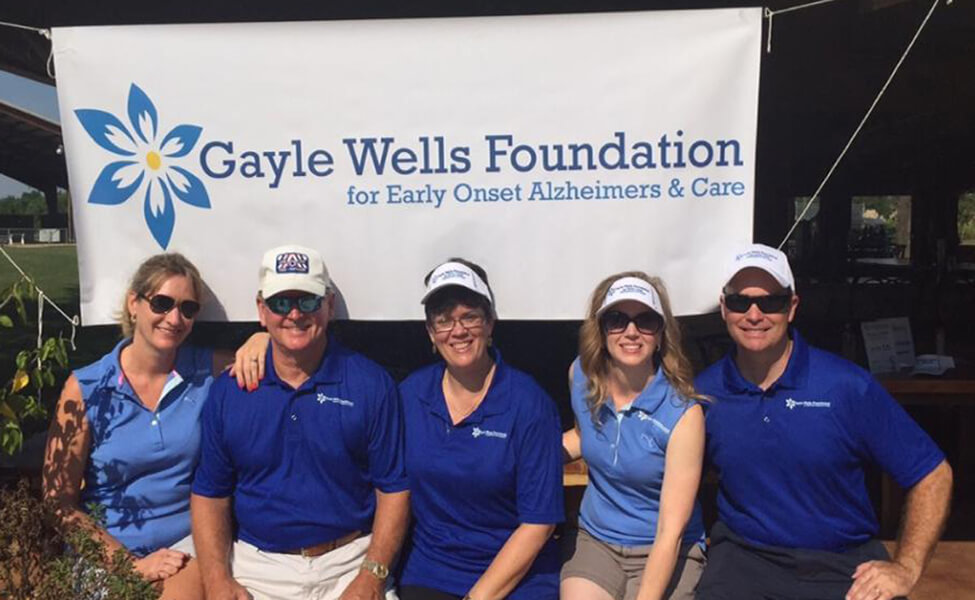Written by: Melinda Mattson
Memory Care Advocate & Board Member, Gayle Wells Foundation for Early Onset Alzheimer’s & Care
Meaningful communication is at the heart of every trusted relationship, which is what makes the loss of conversation through early onset Alzheimer’s disease especially painful. But with a bit of knowledge and creativity, we can still have meaningful connection with our loved ones.
The first step is to understand the process of the disease’s impact on communication. While every individual’s experience with early onset Alzheimer’s disease is different, it is common for those affected to forget important events, call things by the wrong name, or forget words. With this in mind, we need to be prepared to find a new approach to interaction.
We also need to consider the context of the conversation. Face to face is ideal since the phone can present another level of confusion for the individual with early onset Alzheimer’s disease. Video chats are one alternative for those who wish to connect from afar.
Ultimately, respect needs to remain at the heart of each of our interactions. Seeking first to understand before trying to be understood will be our golden rule as we approach conversation. While we may not always understand what our loved ones are trying to communicate, we can sympathize with the challenge they face in struggling to be understood.
Our job is not to make them understand. We may not be able to do this nor is it our charge. Our role is to lean in, listen, and offer our reassuring presence. Even if what they are saying isn’t aligned with facts or reality, their feelings and experience are real to them and worthy of dignity.
Refrain from arguing or correcting. Pointing out mistakes to an individual with early onset Alzheimer’s disease often erodes trust and increases frustration and embarrassment for them.
The litmus test in correcting an individual with early onset Alzheimer’s disease is to ask if their line of thinking will harm them or others. If not, let it go and meet them where they are.
The key to connecting with individuals with early onset Alzheimer’s disease is to remember they are still with us. Because we no longer talk in the ways we used to, it’s easy to assume they aren’t available. But indeed, they are, we’ll just need to be a bit more creative to reach them.
Just as you would approach anyone who experienced trauma with gentleness and respect, so we should with those experiencing forms of dementia. Losing any portion of mental function is frightening and traumatic for anyone. Our approach must be filled with the utmost care and tenderness.
Consider these suggestions as you engage in conversation:
- Introduce yourself as you enter the room. Call the individual by name and make eye contact.
- Speak directly to them and not to a caregiver about them in their presence.
- If possible, carry on a one-on-one conversation without the distraction of other conversations, radio, or TV.
- Speak in a dignified tone, not in baby talk.
- Gently hold their hand or touch their arm as you speak.
- When asking questions, limit the answer choices instead of asking open ended questions. For example, ask “Would you like a water to drink?” Rather than, “What would you like to drink?”
- Give simple one-step instructions. Gesture or point to objects for reference. Use pictures to help them reminisce.
- Be exceedingly patient and positive with mistakes. Instead of correcting, use positive language such as “Let’s try it this way.”
- Pay attention to non-verbal cues. Is your loved one excited or upset? Even if you’re unsure of the words they are saying, sympathize with the emotions they’re displaying.
- Reassure, reassure, reassure. Praise their efforts without condescension and patiently wait for them to find their words.
- Do not say “I told you this already,” or “Don’t you remember?”
- If they’re unable to find the words, offer suggestions. “Are you trying to tell me you want your sweater?” If you’re still not understanding their request, ask if they’d like to write a note or point to what they want.
- If they speak of non-sensical things or incorrectly recall dates or events, resist the urge to correct them.
- If they are enjoying a conversation about a made-up event or person, join them. While it may feel uncomfortable at first, allowing them the pleasure of conversation is the point.
- If conversation isn’t working on a given day, offer your quiet presence as a gift to them. Try again another day.
- If your loved one is non-verbal, remember your presence and company communicates care and love. Gentle physical touch and meaningful eye contact often speak more than words.
We appreciate the immense sadness and grief associated with failed attempts to communicate with your loved ones. We are committed to providing the best resources to you to help you meet these challenges and connect with your beloved.
Let us hear from you if you have found methods to reach your loved one. We are better together.
Sources:
Mayo Clinic: Tips for Better Communication
Aspired Living: Overcoming Communication Barriers


